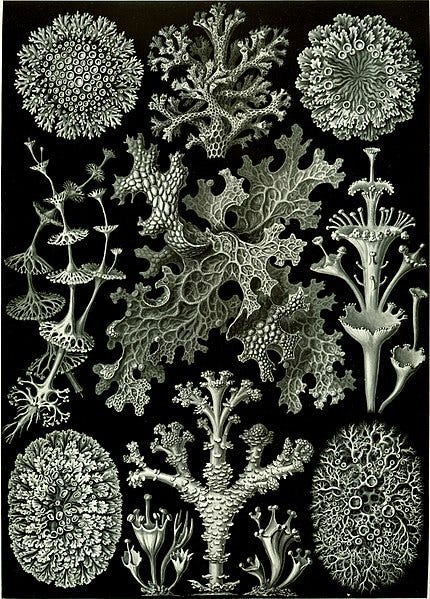Three Lessons From Lichens
In which we learn valuable lessons from the most unlikely of teachers

Lesson 1: The whole is more than its parts
At various points in the evolution of life, a fungus met an alga (or a cyanobacterium) and they decided to work together. The results of those tight-knit partnerships are lichens. You know, those rough pastel patches on sidewalks, your terrace, or your house’s façade that you want to get rid of.
Those unwanted smudges are evolutionary marvels that can teach us a lot about life.
Lesson one, a lichen can do more than each of its symbionts. Unlike the fungus partner, the lichen can drink sunlight photons for energy; unlike the alga partner, the lichen can basically grow anywhere. Arctic tundra? Dry rock face? Toxic waste? Space? The lichen can withstand much more than its individual components can, which is an important lesson.
For example; you struggle with depression. In your darkest days, it feels as if there’s nothing more than that soul-sucking despair.
Make no mistake. There is no cure for depression. But there are many treatments that can return sunshine to your cloudy skies. Depression, as the ancient Roman poet Horace so aptly put it, is a black dog that only you can see as it follows you around (a metaphor famously co-opted by Winston Churchill). Here’s the thing: you can leash a dog; put a collar on it and train it to sit and listen to your commands. Even if you have a disposition for depression, even if that is a part of you, it is never all of you.
The whole of you is always more than its parts.
Thus spoke the lichen.
Lesson 2: Break new ground
Lichens are known as a pioneer species; they are often the first to break ground in a new habitat. As they slowly transform the inhospitable and barren land, other species come by for a peek. Eventually, those others settle there too. Lichens are not afraid of new places and they provide the building blocks for thriving communities.
We could go the social media route and summarize this lesson as ‘just try new things’. But why would we stick to shallow self-help? Lesson two is not about the typical ‘come out of your shell’ advice all introverts are intimately familiar with.
No, lesson two is about openness to experience, which, despite the name, is about much more than simply ‘doing new things’. Openness to experience is a composite trait with six underlying traits: an active imagination, aesthetic sensitivity, introspective ability, preference for variety, intellectual curiosity, and the will to challenge authority when needed. Most of those are not about ‘doing’. (As an example, I score high on both ‘introversion’ and ‘openness to new experiences’, if you lend any credence to personality tests.)
Openness is about not dismissing new things out of hand; it’s about intellectual honesty, general curiosity, and the ability to identify and set aside your own biases.
Lichen lesson two encourages you to embrace new ideas as well as new actions, to not judge prematurely, and to prepare the soil for those who come after you.
Lesson 3: Above all else, persist
Lichen are part of a distinguished group of organisms called polyextremophiles. Or, they can survive, even thrive, in a variety of conditions that destroy many other forms of life.
They are champions of persistence. No matter how bleak their circumstances, above all else, they persist.
Say you like to write. And no matter what anyone tells you, writers want to be read, so say that you put some of your writing online or you send it out to magazines, with a strange combination of trembling fear and reckless abandon in your core. And… nothing. Nobody reads it or it gets rejected. That’s okay, you don’t want to be a one-trick pony and you are not blind to the reality of writing in the age of social media. You try again. Nothing. Again. Nothing.
You will think about giving up. You will have to make concessions. You will have to rethink how you spend your time and how much rejection you are willing to bear.
But.
But, if you find those things that, for however briefly, can make you flow, you dig deep to unearth that stubbornness that keeps you coming back to those things.
Be like the lichen, and above all else, persist. It is hard. It is so, so hard. It might even break you, that necessity of persistence through adversity, and reduce you to rubble.
That’s alright. Lichens grow anywhere, even in rubble.
Related thoughts:






I like that you say "The whole is more than its parts". I also like the concept that the part is influenced by the whole. In the case of our brain, it may be quantum entanglement when neurons become interconnected in such a way that the state of one neuron influences the state of another, even when they are separated. This can happen locally, in the brain, or over vast distances. Quantum coherence allows for the overlapping of local mechanical behaviors with wholistic ones. Ubuntu. Thanks. Geoff